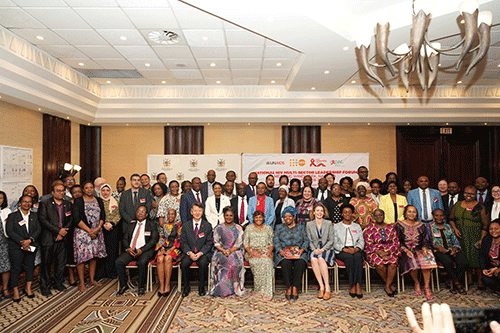The LGBTQI+ community navigates this country daily to survive because of their sexual orientation, which perpetuates unsolicited sexual acts and other forms of violence against them, Positive Vibes Namibia’s Jonathan Sasha Solomon has said.
He said the hostile and discriminatory environments the LGBTQI+ community is enduring cannot be ignored.
“Violence is a byproduct of others and can manifest itself in various ways and in a country where sexual orientation and gender identity is not protected under the law, it becomes a particularly difficult task in ending violence in all its forms for marginalised groups,” said Solomon at the 15th Meeting of the National HIV Multi-Sector Leadership Forum in Windhoek this week.
The Positive Vibes organisation is underpinned by human rights and seeks to address both the internal and external challenges faced by PLHIV, LGBTQI+ people, sex workers, adolescent girls and young women and other marginalised and oppressed populations.
The former journalist noted that these acts manifest in social stigma, discrimination, exclusion, fuelling prejudice, homophobia, transphobia and hate speech and creating a sense of fear, uncertainty and anxiety further causing psychological damage.
“It inhibits people from seeking healthcare for fear of judgement and exposure and exponentially increases the risk. Namibia’s road to equity has been a long and overdue one, however, laws affecting the body autonomy and integrity of LGBTQI+persons need to be addressed,” he pointed out.
He said these laws are insignificant and have an ongoing negative impact on the daily lives of LGBTQI+ persons, sex workers, adolescent girls and young women, contributing to the ongoing and significant stigmatisation and impacting the ability to live with dignity. Solomon said: “It makes it even more difficult to access services such as healthcare, particularly HIV treatment and prevention. When persons in this country are persecuted based on their sexual orientation, gender, gender identity and expression and the means to make a living, it creates barriers in seeking justice and holds the sexual violence perpetrators accountable”.
On the same occasion, PEPFAR country coordinator Cheryl Amoroso said PEPFAR support in Namibia has an equity focus and while the programme provides support throughout the country to all people living with HIV programming, it also targets specific groups focusing on understanding and addressing underlying challenges.
She noted that frequent programme assessment helps the government to make data-driven decisions, adapting strategies and ensuring that resources are allocated to interventions that will yield the greatest results.
“It includes understanding which populations have structural barriers, beyond just service availability, and working with the communities to address them. Mitigation of stigma and discrimination is essential,” she said.
Amoroso stated that optimisation of programming and sustainable solutions for service delivery and prevention technologies require innovation and policies that can be flexible.
She said prevention has long been a cornerstone of PEPFAR strategy globally in the fight against HIV/AIDS for over two decades.
“In Namibia, we are very proud of the work that has been planned and implemented collaboratively with government, civil society and our multilateral partners to support the implementation of the national strategic framework. Under government leadership, the country has seen a 65% reduction in new infections since 2004. Success in HIV prevention in Namibia has relied on strong government commitment and political leadership,” she highlighted.
Also speaking at the event, First Lady Monica Geingos said the realities of progress to be made especially among vulnerable populations, HIV prevention must be country leadership, commitment and accountability starting at the very top, as well as having hard conversations, reflecting on many of the things that Solomon spoke about.
“We all know that HIV prevention has to be realistic and we cannot win this fight if our solutions do not address underlying socio-economic, cultural and structural barriers that predispose key and vulnerable populations,” stated Geingos.


